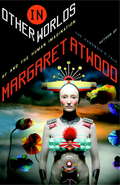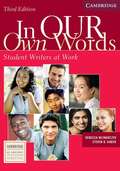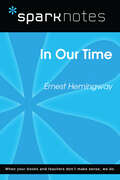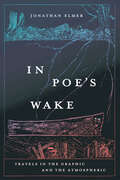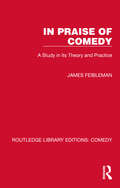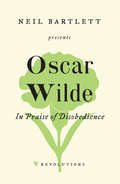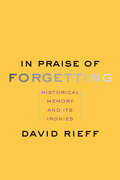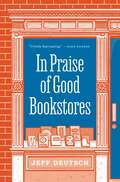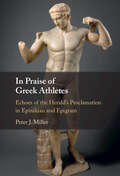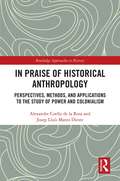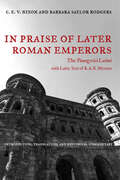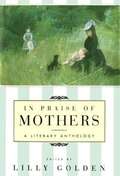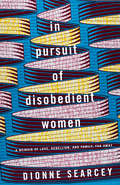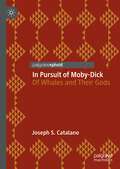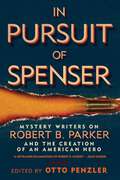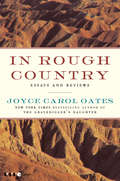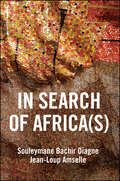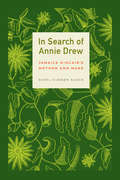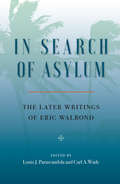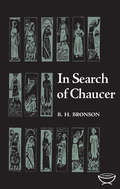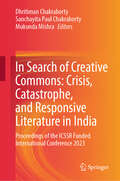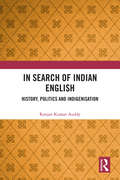- Table View
- List View
In Other Worlds: SF and the Human Imagination
by Margaret AtwoodNote: The electronic version of this title contains over thirty additional, illuminating eBook-exclusive illustrations by the author.At a time when speculative fiction seems less and less far-fetched, Margaret Atwood lends her distinctive voice and singular point of view to the genre in a series of essays that brilliantly illuminates the essential truths about the modern world. This is an exploration of her relationship with the literary form we have come to know as "science fiction," a relationship that has been lifelong, stretching from her days as a child reader in the 1940s, through her time as a graduate student at Harvard, where she worked on the Victorian ancestor of the form, and continuing as a writer and reviewer. This book brings together her three heretofore unpublished Ellmann Lectures from 2010: "Flying Rabbits," which begins with Atwood's early rabbit superhero creations, and goes on to speculate about masks, capes, weakling alter egos, and Things with Wings; "Burning Bushes," which follows her into Victorian otherlands and beyond; and "Dire Cartographies," which investigates Utopias and Dystopias. In Other Worlds also includes some of Atwood's key reviews and thoughts about the form. Among those writers discussed are Marge Piercy, Rider Haggard, Ursula Le Guin, Ishiguro, Bryher, Huxley, and Jonathan Swift. She elucidates the differences (as she sees them) between "science fiction" proper, and "speculative fiction," as well as between "sword and sorcery/fantasy" and "slipstream fiction." For all readers who have loved The Handmaid's Tale, Oryx and Crake, and The Year of the Flood, In Other Worlds is a must. From the Hardcover edition.
In Our Own Words: Student Writers at Work
by Rebecca Mlynarczyk Steven B. HaberIn Our Own Words takes the unique approach of using student writing as a resource for writing instruction and idea development.
In Our Time (SparkNotes Literature Guide Series)
by SparkNotesIn Our Time (SparkNotes Literature Guide) by Ernest Hemingway Making the reading experience fun! Created by Harvard students for students everywhere, SparkNotes is a new breed of study guide: smarter, better, faster. Geared to what today's students need to know, SparkNotes provides: *Chapter-by-chapter analysis *Explanations of key themes, motifs, and symbols *A review quiz and essay topicsLively and accessible, these guides are perfect for late-night studying and writing papers
In Poe's Wake: Travels in the Graphic and the Atmospheric
by Jonathan ElmerExplores how Edgar Allan Poe has become a household name, as much a brand as an author. You’ll find his face everywhere, from coffee mugs, bobbleheads, and T-shirts to the cover of the Beatles’ Sergeant Pepper’s Lonely Hearts Club Band. Edgar Allan Poe is one of American culture’s most recognizable literary figures, his life and works inspiring countless derivations beyond the literary realm. Poe’s likeness and influence have been found in commercial illustration and kitsch, art installations, films, radio plays, children’s cartoons, and video games. What makes Poe so hugely influential in media other than his own? What do filmmakers, composers, and other artists find in Poe that suits their purposes so often and so variously? In Poe’s Wake locates the source of the writer’s enduring legacy in two vernacular aesthetic categories: the graphic and the atmospheric. Jonathan Elmer uses Poe to explore these two terms and track some deep patterns in their use, not through theoretical labor but through close encounters with a wide sampling of aesthetic objects that avail themselves of Poe’s work. Poe’s writings are violent and macabre, memorable both for certain grisly images and for certain prevailing moods or atmospheres—dread, creepiness, and mournfulness. Furthermore, a bundle of Poe traits—his thematic emphasis on extreme sensation, his flexible sense of form, his experimental and modular method, and his iconic visage—amount to what could be called a Poe “brand,” one as likely to be found in music videos or comics as in novels and stories. Encompassing René Magritte, Claude Debussy, Lou Reed, Roger Corman, Spongebob Squarepants, and many others, Elmer’s book shows how the Poe brand opens trunk lines to aesthetic experiences fundamental to a multi-media world.
In Praise of Comedy: A Study in its Theory and Practice (Routledge Library Editions: Comedy)
by James FeiblemanFirst published in 1939, the original blurb reads: We have learned much lately concerning theories of laughter, yet laughter is only what we do about comedy. What is comedy itself? In this work the history of comic instances is combed in the search for the truth about comedy. Today, when laughter is stifled in so many countries, an exposition of comedy shows it to have a universal and necessary character. Comedy, as its natures reveals, is one criterion of the state of human culture; it is highly contemporary and requires freedom – but freedom for adventure, not for routine. After a chapter devoted to the explanation of a logical theory of comedy, the modern comedians are examined, and the humour of every one, from the Marx Brothers to surrealism, from Gertrude Stein to Mickey Mouse, from James Joyce to Charlie Chaplin, is shown to be a constant, inherent in the same set of unchanging conditions.
In Praise of Disobedience: The Soul of Man Under Socialism and Other Works
by Oscar Wilde Neil BartlettWorks of Wilde's annus mirabilis of 1891 in one volume, with an introduction by renowned British playwright.The Soul of Man Under Socialism draw on works from a single miraculous year in which Oscar Wilde published the larger part of his greatest works in prose -- the year he came into maturity as an artist. Before the end of 1891, he had written the first of his phenomenally successful plays and met the young man who would win his heart, beginning the love affair that would lead to imprisonment and public infamy.In a witty introduction, playwright, novelist and Wilde scholar Neil Bartlett explains what made this point in the writer's life central to his genius and why Wilde remains a provocative and radical figure to this day.Included here are the entirety of Wilde's foray into political philosophy, The Soul of Man Under Socialism; the complete essay collection Intentions; selections from The Portrait of Dorian Gray as well as its paradoxical and scandalous preface; and some of Wilde's greatest fictions for children. Each selection is accompanied by stimulating and enlightening annotations. A delight for fans of Oscar Wilde, In Praise of Disobedience will revitalize an often misunderstood legacy.
In Praise of Forgetting: Historical Memory and Its Ironies
by David RieffThe conventional wisdom about historical memory is summed up in George Santayana's celebrated phrase, "Those who cannot remember the past are condemned to repeat it. " Today, the consensus that it is moral to remember, immoral to forget, is nearly absolute. And yet is this right? David Rieff, an independent writer who has reported on bloody conflicts in Africa, the Balkans, and Central Asia, insists that things are not so simple. He poses hard questions about whether remembrance ever truly has, or indeed ever could, "inoculate" the present against repeating the crimes of the past. He argues that rubbing raw historical wounds--whether self-inflicted or imposed by outside forces--neither remedies injustice nor confers reconciliation. If he is right, then historical memory is not a moral imperative but rather a moral option--sometimes called for, sometimes not. Collective remembrance can be toxic. Sometimes, Rieff concludes, it may be more moral to forget. Ranging widely across some of the defining conflicts of modern times--the Irish Troubles and the Easter Uprising of 1916, the white settlement of Australia, the American Civil War, the Balkan wars, the Holocaust, and 9/11--Rieff presents a pellucid examination of the uses and abuses of historical memory. His contentious, brilliant, and elegant essay is an indispensable work of moral philosophy.
In Praise of Good Bookstores
by Jeff DeutschFrom a devoted reader and lifelong bookseller, an eloquent and charming reflection on the singular importance of bookstoresDo we need bookstores in the twenty-first century? If so, what makes a good one? In this beautifully written book, Jeff Deutsch—the former director of Chicago&’s Seminary Co-op Bookstores, one of the finest bookstores in the world—pays loving tribute to one of our most important and endangered civic institutions. He considers how qualities like space, time, abundance, and community find expression in a good bookstore. Along the way, he also predicts—perhaps audaciously—a future in which the bookstore not only endures, but realizes its highest aspirations.In exploring why good bookstores matter, Deutsch draws on his lifelong experience as a bookseller, but also his upbringing as an Orthodox Jew. This spiritual and cultural heritage instilled in him a reverence for reading, not as a means to a living, but as an essential part of a meaningful life. Central among Deutsch&’s arguments for the necessity of bookstores is the incalculable value of browsing—since, when we are deep in the act of looking at the shelves, we move through space as though we are inside the mind itself, immersed in self-reflection.In the age of one-click shopping, this is no ordinary defense of bookstores, but rather an urgent account of why they are essential places of discovery, refuge, and fulfillment that enrich the communities that are lucky enough to have them.
In Praise of Greek Athletes: Echoes of the Herald's Proclamation in Epinikian and Epigram
by Peter J. MillerIn ancient Greece both epinikian songs and inscribed epigrams were regularly composed to celebrate victory at athletic festivals. For the first time this book offers an integrated approach to both genres. It focuses on the ultimate source of information about athletic victory, the angelia or herald's proclamation. By examining the ways in which the proclamation was modified and elaborated in epinikian song and inscribed epigram, Peter Miller demonstrates the shared features of both genres and their differences. Through a comprehensive analysis of the metaphor of the herald across the corpus, he argues that it persists across form, medium, and genre from the Archaic to the Hellenistic period, and also provides a rich array of close readings that illuminate key parts of the praise of athletes. This title is part of the Flip it Open Programme and may also be available Open Access. Check our website Cambridge Core for details.
In Praise of Historical Anthropology: Perspectives, Methods, and Applications to the Study of Power and Colonialism (Routledge Approaches to History #35)
by Alexandre Coello de la Rosa Josep Lluís Mateo DiesteIn Praise of Historical Anthropology is based on a fundamental conviction: the study of society cannot be undertaken without considering the weight of history and separations between disciplines in academics need to be bridged for the benefit of knowledge. Anthropology cannot be limited to situating its object in its immediate context; rather its true subject of study is society as a historical problem. The book describes the complex attempts to transcend this separation, presenting perspectives, methodologies and direct applications for the study of power relations and systems of social classification, paying special attention to the reconstruction of colonial situations. Following the maxim expounded by John and Jean Comaroff, this book will help us understand that historical anthropology is not a matter of merging the two disciplines of anthropology and history, but rather considering societies in their historically situated dimension and applying the tools of the social and human sciences to the analysis. In this vein, the book reviews the complex attempts to bridge disciplinary separations and theoretical proposals coming from very different traditions. The text, consequently, opens up hegemonic perspectives to include 'other anthropologies.'
In Praise of Later Roman Emperors: The Panegyrici Latini (Transformation of the Classical Heritage #21)
by C. E. Nixon Barbara Saylor RodgersHere, for the first time, is an annotated English translation of the eleven later panegyrics (291-389 C.E.) of the XII Panegyrici Latini, with the original Latin text prepared by R. A. B. Mynors. Each panegyric has a thorough introduction, and detailed commentary on historical events, style, figures of speech, and rhetorical strategies accompanies the translations. The very difficult Latin of these insightful speeches is rendered into graceful English, yet remains faithful to the original.
In Praise of Mothers: A Literary Anthology
by Lilly GoldenFourteen unforgettable short stories about mothers by some of the finest writers of our time, contains fiction about both young mothers and older mothers, from the perspective of sons, daughters, and mothers themselves. These stories about motherhood and childhood explore their subject from different and sometimes startling angles, but each touches on the complexity and poignancy-not the sentimentality-of being or having a mother. More than anything else, these stories explore the relationships within all kinds of families-most powerfully, the relationship between mother and child. Included here are Michael Dorris's "Groom Service," about an arranged marriage within a matriarchal society; Frank O'Connor's hilarious "My Oedipus Complex," which describes a small boy's reluctance to share his mother; Alice Walker's "Everyday Use," about a mother's staunch defense of herself and her heritage against her daughter; Charles Baxter's "Fenstad's Mother," in which an aged mother is still wiser than her middle-aged son; and stories by, among others, Hortense Calisher, Mary Lavin, and Pearl S. Buck. In Praise of Mothers will be enjoyed by anyone who is a mother or has a mother-and most of all, by anyone who loves the literary short story
In Praise of Nonsense: Kant and Bluebeard
by Winfried Menninghaus Henry PickfordShells, leafwork, picture frames, hummingbirds, wallpaper decorations, hems of clothing--such are the examples Kant's Critique of Judgment offers for a "free" and purely aesthetic beauty. Menninghaus's book demonstrates that all these examples refer to a widely unknown debate on the arabesque and that Kant, in displacing it, addresses genuinely "modern" phenomena. The early Romantic poetics and literature of the arabesque follow and radicalize Kant's move. Menninghaus shows parergonality and "nonsense" to be two key features in the spread of the arabesque from architecture and the fine arts to philosophy and finally to literature. On the one hand, comparative readings of the parergon in Enlightenment aesthetics, Kant, and Schlegel reveal the importance of this term for establishing the very notion of a self-reflective work of art. On the other hand, drawing on Kant's posthumous anthropological notebooks, Menninghaus extrapolates an entire Kantian theory of what it means to produce nonsense and why the Critique of Judgment defines genius precisely through the power (as well as the dangers) of doing so. Ludwig Tieck's 1797 rewriting of Charles Perrault's famous Bluebeard tale (1697) explicitly claims to be an "arabesque" book "without any sense and coherence." Menninghaus's close reading of this capricious narrative reveals a specifically Romantic--as opposed, say, to a Victorian or dadaistic--type of nonsense. Benjamin's as well as Propp's, Lévi-Strauss's, and Meletinskij's oppositions of myth and fairy tale lend additional credit to a Romantic poetics that inaugurates "universal poetry" while performing a bizarre trajectory through arabesque ornament, nonsense, parergonality, and the fairy tale.
In Pursuit of Disobedient Women: A Memoir of Love, Rebellion, and Family, Far Away
by Dionne SearceyWhen a reporter for The New York Times uproots her family to move to West Africa, she manages her new role as breadwinner while finding women cleverly navigating extraordinary circumstances in a forgotten place for much of the Western world. <P><P>In 2015, Dionne Searcey was covering the economy for The New York Times, living in Brooklyn with her husband and three young children. Saddled with the demands of a dual-career household and motherhood in an urban setting, her life was in a rut. She decided to pursue a job as the paper’s West Africa bureau chief, an amazing but daunting opportunity to cover a swath of territory encompassing two dozen countries and 500 million people. Landing with her family in Dakar, Senegal, she quickly found their lives turned upside down as they struggled to figure out their place in this new region, along with a new family dynamic where she was the main breadwinner flying off to work while her husband stayed behind to manage the home front. <P><P>In Pursuit of Disobedient Women follows Searcey’s sometimes harrowing, sometimes rollicking experiences of her work in the field, the most powerful of which, for her, center on the extraordinary lives and struggles of the women she encounters. <P><P>As she tries to get an American audience subsumed by the age of Trump and inspired by a feminist revival to pay attention, she is gone from her family for sometimes weeks at a time, covering stories like Boko Haram–conscripted teen-girl suicide bombers or young women in small villages shaking up social norms by getting out of bad marriages. <P><P>Ultimately, Searcey returns home to reconcile with skinned knees and school plays that happen without her and a begrudging husband thrown into the role of primary parent. Life, for Searcey, as with most of us, is a balancing act. She weaves a tapestry of women living at the crossroads of old-fashioned patriarchy and an increasingly globalized and connected world. <P><P>The result is a deeply personal and highly compelling look into a modern-day marriage and a world most of us have barely considered. Readers will find Searcey’s struggles, both with her family and those of the women she meets along the way, familiar and relatable in this smart and moving memoir.
In Pursuit of Moby-Dick: Of Whales and Their Gods
by Joseph S. CatalanoThis study presents Moby-Dick as a novel with three distinct but interconnecting stories: Ishmael’s, which he shares ten years after it has taken place; Ahab’s, which is Ishmael's account of the memorable captain of a whaling ship; and a third which centres on whales and whaling, which has not received significant critical attention. While each of these perspectives compete for prominence in the narrative, Ahab and Ishmael's stories have often distracted from the vital significance of the whaling narrative as what outlasts Ahab’s obsessive mission. Catalano rights this wrong by coming to a strikingly original and thought-provoking conclusion which becomes the heart of the book's argument: “the unity of Melville’s book comes, first, from the way the numerous literary, philosophical, and religious reflections are rooted in those magnificent beings, whales and in the men and ships that pursue them, and, second, in the way these reflections illuminate our own lives.”
In Pursuit of Spenser: Mystery Writers on Robert B. Parker and the Creation of an American Hero
by Lawrence Block Ace AtkinsWhen Robert B. Parker passed in early 2010, the world lost two great men: Parker himself, iconic American crime writer whose books have sold more than 6 million copies worldwide, and his best-known creation, Spenser. Parker's Spenser series not only influenced the work of countless of today's writers, but is also credited with reviving and forever changing the genre. In Pursuit of Spenser offers a look at Parker and to Spenser through the eyes of the writers he influenced. Editor Otto Penzler-- proprietor of one of the oldest and largest mystery specialist bookstores in the country, New York's The Mysterious Bookshop, and renowned mystery fiction editor whose credits include series editor for the Best American Crime Writing and Best American Mystery Stories, among many others (and about whom Parker himself once wrote, "Otto Penzler knows more about crime fiction than most people know about anything")-- collects some of today's bestselling mystery authors to discuss Parker, his characters, the series, and their impact on the world. From Hawk to Susan Silverman to Jesse Stone and Sunny Randall, from the series' Boston milieu to Parker's own take on his character, In Pursuit of Spenser pays tribute to Spenser, and Parker, with affection, humor, and a deep appreciation for what both have left behind.
In Rough Country
by Joyce Carol OatesIn twenty-nine provocative essays, Joyce Carol Oates maps the "rough country" that is both the treacherous geographical and psychological terrain of the writers she so cogently analyzes--Flannery O'Connor, Cormac McCarthy, Philip Roth, E. L. Doctorow, and Margaret Atwood, among others--and the emotional terrain of Oates's own life following the unexpected death of her husband, Raymond Smith, after forty-eight years of marriage. "As literature is a traditional solace to the bereft, so writing about literature can be a solace, as it was to me when the effort of writing fiction seemed beyond me, as if belonging to another lifetime," Oates writes. "Reading and taking notes, especially late at night when I can't sleep, has been the solace, for me, that saying the Rosary or reading The Book of Common Prayer might be for another." The results of those meditations are the essays of In Rough Country--balanced and illuminating investigations that demonstrate an artist working at the top of her form.
In Search of Africa(s): Universalism and Decolonial Thought
by Jean-Loup Amselle Souleymane Bachir DiagneThis important book by two leading scholars of Africa examines a series of issues that are central to the question of the postcolonial. The postcolonial paradigm, and the more recent decolonial paradigm, raise the issue of the universal: is the postcolonial the first phase of a new universalism, one which would be truly universal because it would be fully inclusive, or is it on the contrary the denial of all universalism, the triumph of the particular and of fragmentation? In addressing this issue Diagne and Amselle also tackle many related themes, such as the concepts of race, culture and identity, the role of languages in philosophy as practised in different cultural areas, the various conceptions of Islam, especially in West Africa, and the outlines of an Africa which can be thought of at the same time as singular and as plural. Each thinker looks back at his writings on these themes, comparing and contrasting them with those of his interlocutor. While Amselle seeks to expose the essentialist and culturalist logics that might underlie postcolonial and decolonial thought, Diagne consistently refuses to adopt the trappings of the Afrocentrist and particularist thinker. He argues instead for a total decentring of all thought, one that rejects all ‘centrisms’ and highlights instead branchings and connections, transfers, analogies and reciprocal influences between cultural places and intellectual fields that may be distant but are not distinct in space and time. This volume is a timely contribution to current debates on the postcolonial question and its new decolonial form. It will be of great interest to students and scholars in a variety of fields, from African studies and Black studies to philosophy, anthropology, sociology and cultural studies, as well as to anyone interested in the debates around postcolonial studies and decolonial thought
In Search of Annie Drew: Jamaica Kincaid's Mother and Muse
by Daryl Cumber DanceThere is perhaps no other person who has been so often and obsessively featured in any writer's canon as Jamaica Kincaid's mother, Annie Drew. In this provocative new book, Daryl Dance argues that everything Kincaid has written, regardless of its apparent theme, actually relates to Kincaid's efforts to free herself from her mother, whether her subject is ostensibly other family members, her home nation, a precolonial world, or even Kincaid herself.A devoted reader of Kincaid's work, Dance had long been aware of the author's love-hate relationship with her mother, but it was not until reading the 2008 essay "The Estrangement" that Dance began to ponder who this woman named Annie Victoria Richardson Drew really was. Dance decided to seek the answers herself, embarking on a years-long journey to unearth the real Annie Drew.Through interviews and extensive research, Dance has pieced together a fuller, more contextualized picture in an attempt to tell Annie Drew's story. Previous analyses of Kincaid's relationship with her mother have not gone beyond the writer's own carefully orchestrated and sometimes contrived portraits of her. In Search of Annie Drew offers an alternate reading of Kincaid's work that expands our understanding of the object of such passionate love and such ferocious hatred, an ordinary woman who became an unforgettable literary figure through her talented daughter's renderings.
In Search of Asylum: The Later Writings of Eric Walrond
by Eric Walrond"Set in the Caribbean, Panama, the U.S., and England, [Walrond’s] fiction captures the experiences of working-class peoples, often migrants, as they confront the depredations of colonialism, racial prejudice, and economic exploitation. . . . A significant and fascinating collection."--African American Review "Brings together a number of interesting pieces of fiction and non-fiction by this Guyana-born, Barbados- and Panama-bred author."--New West Indian Guide "Forms part of a gradual rehabilitation of Walrond’s work that has been taking place in recent years."--Caribbean Review of Books "Place[s] Walrond squarely on the map. . . . In Search of Asylum could not have arrived at a more propitious time."--sx salon "A substantial step forward for black diaspora and black transnational literary studies."--Gary Edward Holcomb, author of Claude McKay, Code Name Sasha "Fills a significant void in our understanding of the life and literary career of Eric Walrond. By collecting, for the first time, the writings Walrond produced following his departure from the U.S. in 1928, Parascandola and Wade have done scholars a rich service."--Heather Hathaway, author of Caribbean Waves Eric Walrond is one of the great underexamined figures of the Harlem Renaissance and the Caribbean diaspora. Very little of his later work has been subsequently published or made readily available to American scholars. His writings, set in the Caribbean, the United States, and Europe, discuss imperialism, racism, the role of the black writer, black identity, and immigration--all topics of vital concern today. Born in British Guiana (now Guyana), Walrond moved to New York City in 1918 where he worked briefly for Marcus Garvey and became a protégé of Charles S. Johnson. During that time, he wrote short fiction as well as nonfiction and gained a measure of fame for his 1926 collection, Tropic Death. In Search of Asylum compiles Walrond’s European journalism and later fiction, as well as the pieces he wrote during the 1950s at Roundway Hospital in Wiltshire, England, where he was a voluntary patient. Louis Parascandola and Carl Wade have assembled a collection that at last fills in the biographical gaps in Walrond’s life, providing insights into the contours of his later work and the cultural climates in which he functioned between 1928 and his death in 1966.
In Search of Chaucer (The Alexander Lectures Series #1958-59)
by Bertrand H. BronsonIn this volume, Professor Bronson is primarily interested in the three worlds which appear in Chaucer's poetry: the dream world; the world of the mundane existence and waking observation; and the world of imagined life through reading. A study of these worlds raises questions about the kind of truth which resides in each, the literary values which can be extracted from them, their essential relation to one another, and the perennial problem of appearance and reality. <P><P>Professor Bronson is also concerned with the general critical approach to Chaucer's writings. He feels that many recent Chaucerian scholars have been misled by their application of critical disciplines nourished on the metaphysical poets to a poet who deliberately practised a style capable of being followed by a moderately attentive ear. The fact that Chaucer's poetry was composed for oral delivery has received no more than lip service from critics; yet Chaucer's relation to his audience is obviously of the greatest importance in understanding his poems. It behooves us, therefore, to clarify our thoughts as to the kind of techniques we may fittingly apply. Professor Bronson suggests that a less sophisticated way of looking at the subject might yield better results. <P> Professor Bronson's book is a form of introduction to this new view of Chaucer; it is not a complete guide but an explanatory visit to each sphere of Chaucer's world, skillfully evocative of the people of the dream legends, the pilgrimage, the literary heroes and heroines of the Middle Ages, whom Chaucer brought into his poetry. This book is decorated with drawings in the manner of woodcuts taken from the three worlds of Chaucer's poetry. The Alexander Lectures for 1958-59.
In Search of Creative Commons: Proceedings of the ICSSR Funded International Conference 2023
by Mukunda Mishra Dhritiman Chakraborty Sanchayita Paul ChakrabortyThis book contains selected papers presented at the international conference titled 'In Search of Creative Commons: Crisis, Catastrophe, and Responsive Literature in India', held at the Abid Ali Khan Centre for Digital Archive and Translation of Cultures, Gour Mahavidyalaya (College) from 31 August to 2 September, 2023 in collaboration with the Department of English, Dr. Meghnad Saha College. The conference was funded by the Indian Council of Social Science Research (ICSSR). In this book, three basic questions are considered. First, as humans try to live in-and-through catastrophes and exceptional situations in the contemporary world, what new perspective can literature as a creative form offer for healing and restorative purposes? Second, what new idioms and narrative styles, massive crises such as famine, partition, migration, the decimation of forests, rivers, and the disappearance of villages held up in creative articulations in colonial and postcolonial times in India? Can these representations be called “responsive literature”? Further, and this is the third major contention of this book, how can responsive literature be thought of as a conceptual category? What new transdisciplinary optic should be adopted to go beyond the limits of the “literary” and eventually include the “non-literary”? The objective of these discussions was to contribute to the larger discursive literature on disaster studies, which we believe has been excessively hegemonized by concepts from the West. By bringing in indigenous ideas from Bhasa Sahitya (language and literature), the images of samaj (society), samata (equity), and ahimsa (non-violence), the existing literature on catastrophe and crisis studies can finally be decolonized.
In Search of Hannah Crafts: Critical Essays on the Bondwoman's Narrative
by Henry Louis Gates Jr. Hollis RobbinsThree years ago, Henry Louis Gates, Jr. discovered an unpublished manuscript, The Bondwoman's Narrative, By Hannah Crafts, A Fugitive Recently Escaped From North Carolina, which turned out to be the first novel by a female African-American slave ever found, and possibly the first novel written by a black woman anywhere. The Bondwoman's Narrative was published in 2002. In Search of Hannah Crafts now brings together twenty-two authorities on African-American studies to examine such issues as authenticity, and the history and criticism of this unique novel, including Nina Baym, Jean Fagan Yellin, William Andrews, Lawrence Buell, Karen Sanchez-Eppler and Shelley Fisher-Fishkin. The Bondwoman's Narrative will take its place in the African-American canon, and In Search of Hannah Crafts is the book that scholars and students of African-American Studies, of women writers, and of slavery, need to have to understand this unprecedented historical and literary event.
In Search of Indian English: History, Politics and Indigenisation
by Ranjan Kumar AuddyThis book presents a historical account of the development of an acrolectal variety of the English language in colonial India. It highlights the phenomenon of Indianization of the English language and its significance in the articulation of the Indian identity in pre-Independence India. This volume also discusses the sociocultural milieu in which English became the first choice for writers and political leaders. Using examples primarily from the writings of Rammohan Roy, Bankimchandra, Krupabai Satthianadhan, and Gandhi and from the speeches of Vivekananda, Tagore, and Subhas Bose, this book argues that prose written in English in the nineteenth and the early twentieth century scripted a nationalist discourse through its appropriation of the colonizer’s language. It also examines how these works, which absorbed elements of Indian culture and languages, paved the path for the emergence of Indian English as a distinct dialect of the English language. This book will be useful for teachers, scholars, and students of English literature, linguistics, and cultural studies. It will also be of use to general readers interested in the history of the English language and the history of modern India.
